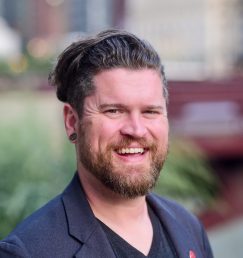UIC class uses Wikipedia as tool to learn, help nonprofits
When Delaney Disario and other students at the University of Illinois Chicago began Zachary McDowell’s Public Relations and Digital Media Comp – 206 class at the beginning of the semester, they were told that their final project would have a lasting impact.
As part of the class requirement, McDowell’s students had to create a Wikipedia page for a nonprofit organization that either didn’t have a page or only consisted of a sentence or two.
Over the last several years, McDowell’s students have built more than 45 Wikipedia articles featuring nonprofits like Love Fridge Chicago, Friends of the Chicago River, Chicago Coalition for the Homeless and even SocialWorks, Chance the Rapper’s nonprofit.
“I see a lot of students who are bored in classes because they are asked to do a bunch of menial work that goes into the trash can at the end of the semester,” said McDowell, assistant professor of communication in the College of Liberal Arts and Sciences. “Wikipedia is one of the top five websites in the world, and it’s the number one place people go for information. In the end, a lot of these pages have stood the test of time.”
The project and the class aim to teach students to be aware of the nuances of language and how it can be neutral and convincing, as well as how language can inform, educate and manipulate opinions. Because Wikipedia is a free online encyclopedia that relies on open-source editing and updates from verifiable news sources, students must pay attention to how language is used and its sources, McDowell said.
“I want them to come out of this understanding the nuances of information literacy,” he said. “This isn’t just about PR, it’s about fake news, propaganda and discerning opinion from factual-based evidence and understanding the erosion of traditional journalism.”
Wikipedia has been a great medium to teach students about sourcing, reliability, verifiability and neutrality in language and representation, according to McDowell.
He works with the Wiki Education Foundation, a nonprofit organization that helps students edit Wikipedia by providing resources and training modules. Without this organization and its helpful people, McDowell said, these types of projects would be far more difficult to scale. In his research on using Wikipedia, McDowell has coauthored a book, “Wikipedia and the Representation of Reality,” and an article in Sage Journals on Wikipedia as Open Educational practice.
The students begin their project just weeks into the class by analyzing the Wikipedia pages of many organizations and then comparing them with the organization’s home webpages as well as other sources.
The students then focus on a nonprofit that either has no, or very little, representation on Wikipedia and expand it. They are told to come up with at least 1,500 words, which must be as perfect as possible through the process of writing, editing and critiquing.
“They quickly learn that about 90% of good writing is editing,” McDowell said.
The students learn through this process that companies’ websites and press releases push an agenda, while the goal of Wikipedia is to share information in a neutral way because it is a tertiary source that uses secondary sources such as news stories as the basis of information.
“Wikipedia articles allow them to present something to people in a way that can be digested and understood, and it gives the organization they are writing for a better chance at being seen,” McDowell said.
After coming up with their group, students reached out to the nonprofits to see if they had secondary source material to include as well as to fact-check items for accuracy. Wikipedia doesn’t use words like truth or objectivity; it uses words like reliability, verifiability and neutrality, McDowell said.
Disario, who is entering her senior year, worked on the Wikipedia page for The Love Fridge Chicago. Members of her group connected with members of the organization, which addresses food waste and food insecurity by providing community fridges that are stocked with food.
Representatives from the nonprofit welcomed the updated page and provided input to the students for their project, which was published at the end of their class. Disario said she was grateful for the opportunity to help a worthwhile organization.
“I think the best part about it was knowing I got to do something good for more than just myself. We got to help a nonprofit organization and work towards a goal that wasn’t just a final exam or a paper that would never go anywhere outside of the class,” Disario said. “I absolutely loved being able to help spread the word about a great organization, and the fact that I got to do it for a class made it so much better.”

